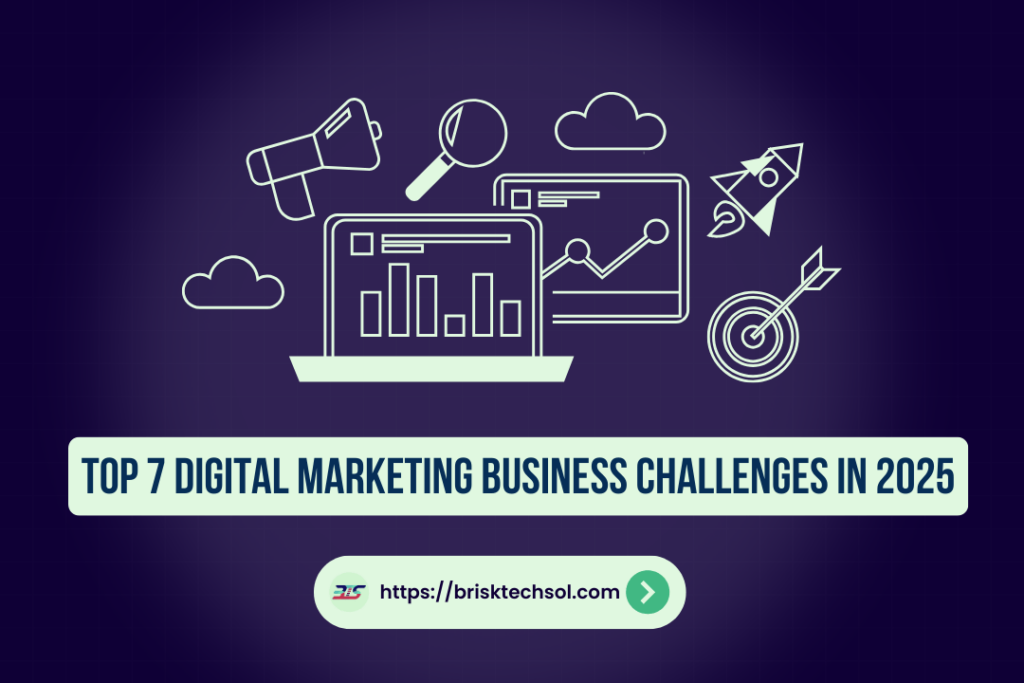Digital marketing business systems are essential for businesses to thrive in the online world. However, integrating and managing various tools, staying within budget, and keeping up with constant changes can present significant challenges. This article explores the key obstacles in digital marketing systems and offers practical solutions to overcome them, ensuring smooth and efficient marketing operations.
The Foundation of a Digital Marketing Business System
A digital marketing business system refers to the integration of tools, technologies, and strategies used to manage online marketing campaigns. It encompasses everything from automation tools and Customer Relationship Management (CRM) systems to analytics platforms and content management systems (CMS). These systems help streamline marketing efforts, allowing businesses to target the right audience, measure performance, and optimize campaigns in real-time.
The core components of a digital marketing business system include:
- Marketing Automation: Tools like HubSpot, Mailchimp, and Marketo automate repetitive tasks such as email marketing, social media posting, and lead nurturing.
- Customer Relationship Management (CRM): Systems like Salesforce and Zoho help businesses manage customer interactions, track sales, and improve customer service.
- Analytics and Data Tools: Google Analytics and Adobe Analytics provide valuable insights into website traffic, user behavior, and campaign performance.
- Content Creation and Management: Platforms like WordPress and Squarespace help businesses create, publish, and manage digital content.
These tools, when properly integrated, can make a significant difference in the efficiency of a business’s marketing operations. However, integrating them into a cohesive system is not always a straightforward task.
Top Challenges in Digital Marketing Business Systems
Despite their many benefits, digital marketing business systems often face several hurdles. Below are some of the most common challenges:
A. Integration Issues
One of the most significant obstacles businesses face is the integration of various marketing tools. As companies use different software for email marketing, CRM, analytics, and social media management, these tools often fail to work seamlessly together. This leads to data silos, inconsistent customer data, and inefficiencies in campaign execution.
- Data Silos: Without a unified system, data from different tools is stored separately, making it difficult to get a complete picture of marketing performance.
- Complex Integrations: Integrating tools like Salesforce with Mailchimp or HubSpot with Google Analytics requires technical expertise and can often be time-consuming.
Solution: Businesses can overcome integration issues by adopting tools that offer native integrations or using middleware solutions like Zapier. Additionally, creating a unified dashboard that consolidates data from multiple sources can improve efficiency.
B. Budget Constraints
Digital marketing often requires substantial investment, especially when scaling campaigns. Many businesses struggle with balancing marketing costs and performance, particularly when trying to justify the return on investment (ROI). Deciding where to allocate the budget—whether to focus on SEO, paid advertising, or social media—can be a challenging decision.
- Limited Budgets: Smaller businesses may not have the resources to invest in advanced tools or hire specialized personnel.
- Unpredictable Costs: Digital marketing campaigns, especially paid media campaigns, can quickly spiral out of control if not monitored closely.
Solution: Prioritize high-ROI channels and continuously monitor performance to allocate budget effectively. Using analytics tools to measure cost-per-click (CPC), customer acquisition cost (CAC), and lifetime value (LTV) can help make informed budget decisions.
C. Data Management and Analysis
In the digital marketing world, data is king. However, with the sheer volume of data generated from campaigns, websites, and customer interactions, managing and extracting valuable insights becomes a significant challenge. Marketers often find themselves overwhelmed by raw data and struggle to derive actionable strategies.
- Data Overload: Without proper organization, businesses can drown in data, making it difficult to pinpoint key insights.
- Complex Analysis: Extracting meaningful patterns from data requires advanced skills in data analytics, which many marketing teams may lack.
Solution: Implement AI-driven analytics tools that can help identify trends and predict outcomes. Regularly conducting data audits can also ensure that only relevant data is collected and analyzed.
D. Keeping Up with Trends and Algorithms
Digital marketing is a constantly evolving field, with frequent changes in algorithms, tools, and strategies. Social media platforms, search engines, and other digital channels frequently update their algorithms, which can disrupt established marketing strategies.
- Algorithm Changes: Updates to Google’s search algorithm or Facebook’s news feed can significantly affect organic reach and paid ad performance.
- Emerging Trends: Marketers must stay updated with trends like voice search, artificial intelligence, and blockchain, which may impact marketing strategies.
Solution: Regularly invest time in research to stay updated with industry news. Subscribing to marketing blogs, attending webinars, and participating in online communities can help marketers stay ahead of the curve.
Effective Solutions for Overcoming Challenges
While digital marketing systems present challenges, there are several effective solutions that businesses can implement to overcome them.
A. Leveraging Technology and Automation
Automation is a game-changer in digital marketing. By using AI-powered tools, businesses can streamline repetitive tasks, improve targeting, and enhance customer engagement. For example, marketing automation platforms like HubSpot or Mailchimp can automatically send personalized emails based on user behavior, while social media tools like Hootsuite can schedule posts across multiple platforms.
Example Tools:
- HubSpot: Offers automation for email marketing, lead nurturing, and CRM integration.
- Google Analytics: Helps track user behavior and measure campaign performance in real-time.
- Salesforce: A CRM that integrates with marketing tools to improve lead management and customer interactions.
B. Building a Skilled Team
Digital marketing requires continuous learning. Building a team of skilled professionals who are knowledgeable about various marketing tools, trends, and techniques is essential for overcoming system challenges. Regular training and certifications (like Google Ads or HubSpot Academy) ensure that team members stay updated on the latest developments.
Solution: Invest in ongoing education and certifications for your team. Encourage cross-departmental collaboration between marketing, IT, and analytics teams to improve workflow and efficiency.
C. Creating Agile Strategies
Digital marketing is fast-paced, and campaigns can change in an instant. To stay competitive, businesses must adopt agile marketing strategies that allow for quick adjustments. Regularly conducting A/B testing, analyzing real-time data, and optimizing campaigns based on performance can help businesses respond to changes in market conditions and consumer behavior.
Solution: Implement agile methodologies in your digital marketing strategy. This involves testing different campaign strategies and refining them based on performance feedback.
Future Of Digital Marketing Business Systems
As technology advances, digital marketing systems are becoming more sophisticated. Some of the key trends shaping the future of digital marketing include:
- Predictive Analytics: AI-powered tools will be able to predict customer behavior, enabling businesses to personalize marketing efforts even further.
- Customer-Centric Marketing: A shift towards creating hyper-personalized customer experiences using data from CRM and marketing automation tools.
- Blockchain: The rise of blockchain technology will revolutionize digital marketing by ensuring transparency in ad buying and data management, reducing fraud and improving trust.
Conclusion
Overcoming digital marketing system challenges is crucial for business success. By using automation, investing in skilled teams, and staying agile, businesses can effectively address integration issues, budget constraints, and evolving trends. With the right strategies in place, companies can optimize their digital marketing efforts and stay ahead of the competition in an ever-changing landscape.
FAQ’S
What are the biggest challenges in digital marketing business systems?
The biggest challenges include integration issues, data management, budget constraints, and keeping up with algorithm changes.
How can small businesses overcome digital marketing challenges?
Small businesses can overcome challenges by leveraging affordable tools, prioritizing high-ROI channels, and continuously educating their teams.
Why is CRM integration important in digital marketing?
CRM integration ensures that customer data is centralized, enabling businesses to provide personalized marketing and enhance customer relationships.
What tools can help streamline digital marketing systems?
Tools like HubSpot, Google Analytics, Salesforce, and Hootsuite can help streamline marketing efforts through automation and centralized data management.
How do algorithm changes impact digital marketing strategies?
Algorithm changes can affect organic reach, paid ad performance, and search rankings, requiring marketers to adjust their strategies accordingly.









